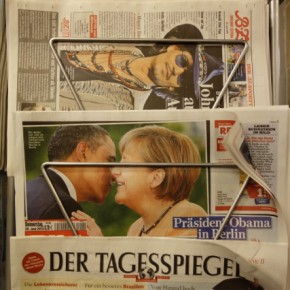I have many relatives who despise Shi’i, Sufi, and Ahmediyyah Muslims. Their religious practices are regarded with great suspicion. The main cause is Saudi-Pakistani incitement against their alternative religiosity, whether in Shi’i veneration for the Imams, the diversity of Sufi mysticism, or the Ahmeddiyah acknowledgement of a messianic Mahdi figure.
Such suspicion usually precedes an accusation of these various groups as engaging in shirk, or religious idolatry that interferes with the worship of Allah. This discourse frequently leads to campaigns of violence against these minority groups, whether in pogroms, or state repression. Much of this is state-circulated, meaning that popular discussions about shirk have sectarian conclusions rather than vibrant theological debates. It is no coincidence that Sunni hardliners who further this rhetoric do not discuss the shirk present in modern Salafism.
Understanding Salafi shirk requires a little theological background. There are two types of shirk: Shirk-e-Akbar, and Shirk-e-Asghar. Shirk-e-Akbar is major and refers to open polytheism. It usually comprises associating anyone with Allah and/or divine attributes. This is in violation of tawheed, the Islamic principle that Allah has oneness and unity. Shirk-e-Asghar, in contrast, is comparatively minor and is concerned with hidden polytheism. This form of shirk occurs when the violator acknowledges tawheed, but engages in thoughts and behaviors that do not reflect this belief. Both are at play among many Salafi movements.
It is important to remember that Salafism is not a uniform Islamic phenomenon. While some Salafists are intent on opposing capitalist globalization, others fully embrace its most recent incarnation in economic neoliberalism. As a Muslim, I’m inclined to believe that their resulting mixture of Islam and neoliberalism verges on committing shirk.
Dating back to the works of Adam Smith, much of laissez-faire capitalism has been predicated on a belief that an unrestrained market will either solve, or greatly alleviate, social ills. This rhetoric is often taken to be an absolute, with market liberalism focusing on a philosophy that unconscious economic forces will organically direct human societies towards prosperity. Smith’s idea of the invisible hand turns the marketplace into a poorly-understood supernatural force that must be given primacy for the betterment of civilization. Smith continues to be read widely because, despite new, and conflicting historical circumstances, neoliberal discussions of market primacy still rely heavily on an idea of liberating Smith’s market forces
Shirk comes into play because there is a thin line between Smith’s hand, and the hand of Allah. Neoliberalism amounts to a quasi-religious deification of market primacy. Trusting the market to organically address social problems is not very different from believing that the will of Allah can be relied upon to confront these same grievances. The market is assigned supernatural aspects that give it an almost divine superiority over material reality, which are then bowed towards in a system of global capitalism.

For this reason, the Salafi Muslims that embrace market primacy are committing shirk. This category happens to include the monarchical elites in the Persian Gulf, such as the Saudi Arabian Wahhabis that have appointed themselves the guardians of Islam.
More broadly, Salafi movements that do not directly tackle the complexity of a politically-stratified society verge on embracing shirk in various other ways. Stratified social orders are predicated on various doctrines that verge on bowing down to a secondary divinity. These include nationalism, racism, patriarchy, and so on. However, the most significant of these involve the core beliefs of Salafism itself, in which an Islamic mythology risks overtaking Allah as a religious focus.
Many of the movements that fall under the umbrella of Salafism began as a reaction to imperialism. They arose from intellectual discourse in the Muslim world that sought to understand which specific weaknesses led to European conquest. Salafism posits that the primary cause of imperialism was the Muslim world having deviated too substantially from Islamic teachings. It maintains that Muslims became a colonized people because they lost track of sunnah, a normative way of life based on specific interpretations of the Qu’ran and Hadith.
For Salafis, the sunnah operates as a rigid discipline of purification. The religious movement’s appeal should be examined through a desire for social cleansing, which is why the ideology takes so much issue with matters of substance use and sexual activity. The movement thrives in Muslim populations that have a desire for purity and salvation. Sunnah becomes a discipline aimed at facilitating this salvation, returning to Islamic roots in order to heal the trauma of imperialism by emulating the Prophet Muhammad.
The primary fantasy for many Salafis is of the Rashidun Caliphate. The rule of the Four Rightly Guided Caliphs, which immediately followed the death of the Prophet, has been given a paradisiacal flare as a result of Salafi rhetoric. Rather than being a part of Islamic history, the Rashidun has become treated as a utopia that was marked by general prosperity and military strength. It has essentially exited Islamic history and become a mythology that is suspended from reality, with sunnah being reduced to a tool that may realize it under modern conditions.
The process of attributing the attributes of Allah to another figure is extremely complex. It means that qualities which are traditionally the domain of Allah begin to mix with another figure, to which the religious then bow. This new Islamic mythology of sunnah and Rashidun eat away at many qualities that traditionally reside in Allah, from promises of an ethical renaissance, to peace, mercy, and freedom. It is shirk because it twists sunnah and erases historical facts of the Rashidun in favor of an obsession that is often quasi-religious. The discipline of Qu’ran and Hadith become the entire focus of worship, with Allah acknowledged, but not discussed in any substantive way due to a ritualistic drive towards realizing the Rashidun.
Of course, none of this is necessarily a problem. Islam is a religion that means different things at various periods in history. The drive towards realizing the Rashidun can ultimately be seen as an acceptable period of Islamic history that affects the Muslim world’s experiences with European imperialism. It may even ultimately lend weight to a leftist mission that seeks to build a Rashidun utopia that has moved beyond market capitalism.
These arguments have mainly been a means to argue that no area of Islam is immune from flirting with shirk, as even veneration of the Qu’ran has been speculated as such by movements as early as the Mu’tazallites. Problems arise when the toxic label of shirk is used to inspire sectarian consequences and rally support around Salafist state policy.
Muslims must be brave enough to doubt this rhetoric, whether it is levied against other Muslims, Christians, Atheists, Buddhists, and so on. Every Islamic movement has its flaws. Every Islamic movement has some level of shirk. Every Islamic movement has some level of sin, hypocrisy, and so on. It is perfectly fine that they are flawed, so long as Muslims acknowledge them as such, and avoid centering state policy on these imperfections. Problems begin with those that claim, falsely and with absolute certainty, that they alone are perfect. It is these types of statements that imply the ascendency of a somewhat nihilistic revolutionary movement dedicated to the Rashidun, which, unfortunately, would be more fascistic than Islamic.
Photographs courtesy of Tarek. Published under a Creative Commons license.





